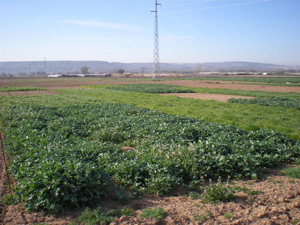
Campus Moncloa
Campus of International Excellence
Cover crops, towards a sustainable agriculture
Researchers at the UPM have demonstrated that replacing the traditional fallow with cover crops can reduce nitrate pollution without increasing the salinity or reducing yield.
19/11/2012
Researchers at the UPM have demonstrated that replacing the traditional fallow with cover crops can reduce nitrate pollution without increasing the salinity or reducing yield.

View of one of the tests on barley, vetch, rapeseed and bare ground. Source: José Luis Gabriel Pérez.
However, the accumulated water and nutrients increase the risk that pesticides and even the nutrients can be produced (with the consequent contamination of aquifers). If the fallow periods and the accumulation coincide with strong or extended periods of rainfall, the risk increases even more.
An interesting alternative to reduce these risks is the introduction of cover crops or capture. These minor crops are not intended to produce fruit or grains but to reduce the amount of free nutrients in the soil (fixing them to their biomass) during intercrop periods.
In order to analyze the efficiency of these cover crops as well as possible negative effects on the main crop (the maize in this case), researchers of the UPM have developed diverse essays by using different types of cover crops during six consecutive years at the “La chimenea” land of the IMIDRA and in the “Campos de Prácticas” at the School of Forestry. These essays were monitored; they analyzed its development and crop coverage as well as the soil moisture at different stages of depth for each treatment.
As a result of these essays, they concluded that cover crops are truly efficient for the control and nitrate leaching, mainly for the species of the gramineae family, and even though none of the species presented yield reduction of the following maize, legume species presented beneficial effects in terms of production.
They also studied the risk of increased soil salinity that can affect the maize production when leaching is reduced. In this sense, it was observed that although there is a reduction in the amount of salts because of the leaching, the total balance of salts continues being negative in the system despite introducing cover crops. They did not observe any increase of soil, even reducing the surface layers; this allowed them to enhance the conditions for sowing and germination of maize. The study (1,2,3) was funded by the Research National Plan and the European Commission.
(1) Gabriel, J.L., Muñoz-Carpena, R., Quemada, M., 2012. The role of cover crops in irrigated systems: water balance, nitrate leaching and soil mineral nitrogen accumulation. Agric. Ecosyst. Environ. 155, 50–61.
(2) Gabriel, J.L., Almendros, P., Hontoria, C., Quemada, M., 2012. The role of cover crops in irrigated systems: Soil salinity and salt leaching. Agric. Ecosyst. Environ. 158, 200–207.
(3) Gabriel, J.L., M. Quemada. 2011. Replacing bare fallow with cover crops in a maize cropping system: Yield, N uptake and fertiliser fate. European Journal of Agronomy 34(3): 133-143.
Tag: Agri-Food and Health Source: Universidad Politécnica de Madrid
Event date:
19/11/2012
